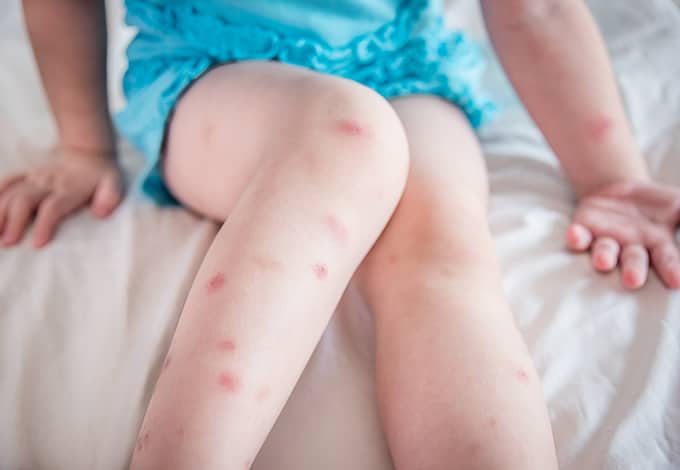

Are Bed Bugs Dangerous?
The alarming increase in bed bug infestations across the country has caused researchers to look more closely at what dangers these blood-eating pests may cause when they get into residential homes. Danger can come in many forms. When bugs get into homes, they can eat away at wooden support structures, deface interior paint and wallpaper, eat holes in clothing, stain draperies, and damage furniture. Some pests pick up harmful bacteria from trash and septic areas and transmit them to food storage areas and kitchen counters. Some bugs have venom and are considered a serious health threat. Others are directly linked to the spread of diseases. So, where do bed bugs fit into this picture? Are they a dangerous bug to have in your home? Let's take a look.

Bed Bugs And Disease
Many diseases are transmitted by bugs—and most specifically, by bugs that are parasites (blood eaters). Ticks, mosquitoes, and fleas are linked to the transmission of dangerous diseases that are of significant medical importance.
Black-legged ticks (deer ticks) are the most noteworthy of the handful of ticks that bite humans. This is because they are known carriers of Lyme disease. When Lyme disease is not caught early, it can develop into a neurological disorder that has symptoms that significantly overlap other diseases, such as chronic fatigue, fibromyalgia, rheumatoid arthritis, multiple sclerosis, Parkinson's disease, ALS, depression, and Alzheimer's, which makes it hard to diagnose properly. But, Lyme disease is only one of many tick-borne diseases. Ticks are connected to the spread of Rocky Mountain spotted fever, Tularemia, ehrlichiosis, Colorado tick fever, babesiosis, STARI, anaplasmosis, Powassan disease, and more.
The mosquito is considered by many to be the most dangerous creature on the planet due to its connection to the spread of malaria, which claims over a million lives worldwide every year. These blood eaters are also linked to several other diseases that can lead to death. West Nile, dengue, and chikungunya virus are the most medically significant here in the United States. Mosquitoes can also transmit the Zika virus. This virus is directly linked to microcephaly in unborn children, a congenital birth defect that has lifelong implications.
Fleas are most notable for the illness they transmit to dogs and cats, such as tapeworm, flea allergy dermatitis, cat scratch disease, haemobartonellosis, and more. But, they can still transmit plague to humans and are still linked to human fatalities.
While bed bugs are blood-eating insects that carry disease organisms in their bodies, they are not known to spread infectious diseases to humans like the pests mentioned above. So, they are not considered dangerous in this way. However, they are linked to other problems.
Bed Bugs And Household Damage
Many pests get into homes and damage the structure as they chew through the wood including termites, carpenter ants, carpenter bees, powderpost beetles, and more. These pests can also damage interior wallpaper, paint, banisters, furniture, and other keepsakes.
Some bugs stain items in a home when they leave their feces, or they are squished. Lady bugs, stink bugs, and boxelder bugs are the most dangerous to draperies, bedspreads, and carpets.
When silverfish get into a home, they can damage important documents, deface photos, and chew on other important items made of paper.
The larvae from case-making clothes moths chew holes in clothing and damage other cloth items inside a home.
Are bed bugs a danger to the belongings inside your home? They can be. Bed bugs leave their feces in areas they infest or on items as they travel around. These spots and streaks of black can be hard to clean but not permanently damaging in most cases. This is one of the telltale signs of a bed bug infestation.
Bed Bugs And Harmful Bacteria
When cockroaches get into a home, they can spread disease and harmful bacteria that lead to food poisoning, dysentery, diarrhea, and vomiting. They are also considered disease spreaders and a significant danger to those who have asthma.
Many invertebrates are considered vectors of bacterial disease. This is because they feed on rotting and decaying organic matter.
Bed bugs do not climb in trash cans or crawl around in pantries or cupboards. Since they are blood eaters, they do not pose a danger in this way.
What Dangers Do Bed Bugs Present?
While bed bug bites are not medically significant, meaning they are not an immediate health risk, they can lead to secondary infection if scratched bites are not cleaned and disinfected. There is also a chance that exposure to a bed bug infestation can cause psychological issues such as added stress, anxiety, and trouble sleeping for some.
If you have an infection due to exposure to bed bugs, contact a physician. For remediation of bed bugs, seek the assistance of a trusted pest control expert for effective bed bug control treatments.
Customer Testimonials
-
“Beyond friendly and professionally she really understood how freaked out we were and felt like she was in it with us the whole way.”- Emily W.
-
“The gentlemen that came over was very friendly and honest!”- Patty M.
-
“They sent a tech the same day and truly saved the day for my Aunt’s home in New York.”- D. Hunsaker
-
“I called Parkway, got Shoshanah on the phone, told her about the problem (she could tell I was a wreck!) Within an hour Steve was here!”- C. Petronella
-
“Had some scheduling issues and with her kindness patience and professionalism sorted it all out!”- John D.
-
“They were on time and informative in formulating a plan to protect my property from future pests. Will call on Parkway Pest for future services.”- Michael C.
-
“We are long term customers and appreciate all the above listed highlighted qualities (Professionalism, Punctuality, Quality, Responsiveness, Value)”- Caroline M.
-
“Handled our mice situation with a professional and personable approach. Thank you!”- CJ Z.


Our Blog & News
Catch up with the latest blog articles from Parkway or see news that is happening in the pest control industry.







